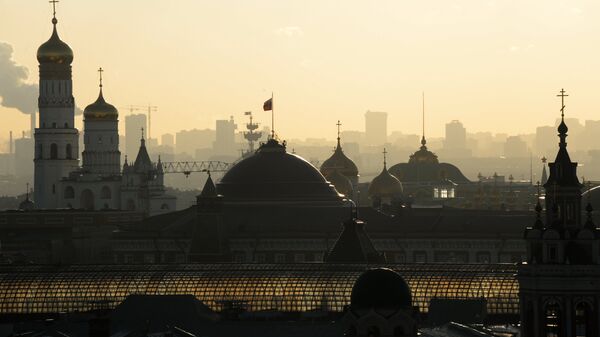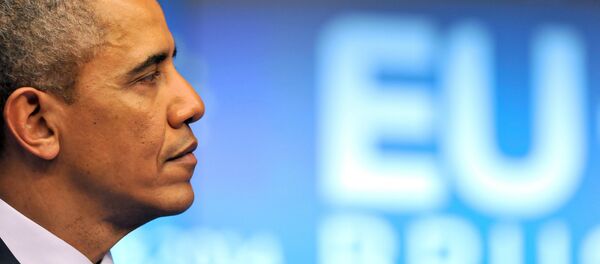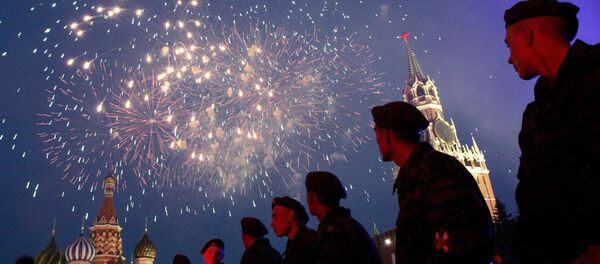And "others go further. Alexander Motyl of Rutgers University recently wrote of a 'coming Russian collapse'. Lilia Shevtsova, a Russian scholar affiliated with the Brookings Institution, believes the collapse has already begun."
But is Russia really on the precipice of decline or even collapse, as these scholars suggest? According to Saradzhyan, "an examination of the data suggests that Russia has actually risen in comparison with some of its Western competitors."
Commenting on Russia's economic and geopolitical performance relative to the US and the advanced European economies including the UK, France, Germany and Italy, Saradzhyan notes that actually, Russia in the last 16 years has gained significantly on all these competitors, and on the world as a whole.
Even using the single instrument of gross domestic product, the analyst recalls that "Russian GDP was less than 5 percent of US GDP in 1999. That share grew to 6 percent in 2015, a 36 percent increase." And that's not even accounting for purchasing power parity.
"Over the same period, Russia's share of global GDP increased by 23 percent, from 1.32 percent in 1999 to 1.6 percent in 2015." This may not seem like much, but in the same period, "the US, UK, French, German and Italian shares in global GDP declined by 10 percent, 11 percent, 19 percent, 20 percent and 32 percent, respectively."
Furthermore, the analyst notes, when using more complex, multi-variable measures that take non-economic factors into account, Russia's gains have been even more significant.
For example, using the Geometric Indicator of National Capabilities (GINC), created by US political scientists Kelly Kadera and Gerald Sorokin, Russia's 'national power' has increased over the past decade-and-a-half by over 6 percent. The GINC measures national power by averaging six ratios, including total population, urban population, steel production, primary energy consumption, military expenditure and military personnel.
According to the measurement tool, between 1999-2014, Russia's power rose by 6.53 percent, "while the power of the US, UK, France, Germany and Italy declined by 13.14 percent, 24.42 percent, 24.23 percent, 29.92 percent and 27.29 percent, respectively."
Chin-Lung's formula is based on three indicators, including population strength, economic strength, military strength. These, in turn, are calculated by measuring national population as a percentage of global population, national land area against world land area, national GDP vs. world GDP and national military expenditures against global military expenditures.
"Applying Chin-Lung's approach shows Russia's power rising by 28 percent between 1999 and 2015, while the power of the US, UK, France, Germany and Italy decreased by 6 percent, 15 percent, 29 percent, 29 percent and 41 percent, respectively."
"Moreover," Saradzhyan adds, "even if we [were] to alter Chin-Lung's approach by reducing the proportional weight of land area and military strength, and added a measurement [on] innovative strength, such as the number of patents filed by residents, the results show Russia rising faster than the US, with the other competitors declining."
Ultimately, Saradzhyan notes, "taken together, these measures suggest strongly that Russia has either risen or retained its position relative to its five competitors and the world as a whole so far in the 21st century."
"Looking forward," the analyst notes that "Russia faces a number of long-term challenges, including an obsolete and inefficient economic model, poor quality of governance, pervasive corruption, demographic fragility, instability in neighboring countries and separatist threats to Russia itself. We don't know yet whether and when these challenges may acquire such an acute character that they may reverse the resurgence of Putin's Russia described above."
"One thing is certain, however: Russia's size, resources and military might all ensure that it remains a global player that will continue to affect the Western world and the global order as a whole in profound ways for years to come, and should be treated accordingly."






